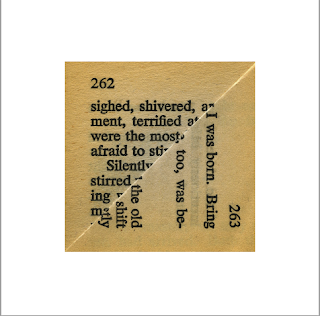Not A Cage
BY JOAN RETALLACK
Scientific inquiry, seen in a very broad perspective may
see Foot 1957, also Wetermarck 1906, Ch. XIII
To man (sic) the world is twofold, in accordance with
that witness is now or in the future
It wasn't until the waitress brought her Benedictine and she
Villandry, "Les Douves" par Azay le Rideau
mine. Yours, CYNTHIA.
Not a building, this earth, not a cage,
The artist: disciple, abundant, multiple, restless
a forgery: Opus loannes Bellini
We named you I thought the earth
is possible I could not tell
to make live and conscious history in common
and wake you find yourself among
and wake up deep in the fruit
Did you get the money we sent?
I smell fire
AT FULL VOLUME. STAGE DARK]
1. Russia, 1927
God, say your prayers.
You were begotten in a vague war
sidelong into your brain.
In Letter Three & Four (as earlier) the narrator is
North Dakota Portugal Moorhead, Minnesota
The lights go down, the curtain opens: the first thing we
gun, Veronica wrote, the end.
'Wittgenstein'
Tomorrow she would be in America.
Over forty years ago
a tense, cunningly moving tale by the Hunga-
Then he moved on and I went close behind.
Interviewers: What drew a woman from Ohio
to study in Tübingen? American Readers
with this issue former subscribers to Marxist Perspectives
The shadow of the coup continues to hover over Spain
In the ordinary way of summer
girls were still singing
like a saguaro cactus from which any desert wayfarer can draw
as is Mr. Fox, but in literature
Twenty five years have gone by
Ya se dijeron las cosas mas oscuras
The most obscure things have already been said
I
nformation from PoetryFoundation.org: Joan Retallack, "Not a Cage" from How to Do Things with Words
. Copyright © 1998 by Joan Retallack. Reprinted by permission of Sun & Moon Press / Green Integer.
Source: How to Do Things with Words
(Sun & Moon Press, 1998)
-----------------------------------------------------
I have found myself in Retallack's position for a different reason. I decided to go digital so I put away several boxes of my books. Some of them I gave away to the Jesuit Volunteer Program. Some of them I gave away to a friend who was building a school library in the province. I also had the impulse to archive but by way of titles. I gave the lists of titles to the people I was donating the books to so they would have a record of what they received. The ironic thing is, despite giving away boxes of books, I have found myself acquiring
more print books alongside my digital books. In fact, I read more comfortably in print sometimes than I do in digital. It's still a mystery for me that I'm trying to figure out.
Retallack's poem, for me, not only calls attention to her chance methodology but also to a changing world. I am what articles call a digital immigrant. I was right smack in the middle of the divide in time that separated
before Internet and
after Internet (unlike my kids who are digital natives). In Retallack's poem I see the broad range of language (in fact, different languages, including Spanish) that are slowly making their way into digital archives and catalogs. The text is now traversing from printed format to XML. I am waiting for a poem that includes its HTML formatting. "The most obscure things have already been said." The most obscure things are multiplying on the Internet. Whole books are resulting from daily status updates on Facebook. Data is accumulating.
Here's an instant poem made out of randomly chosen lines from the first twenty status updates that are in my FB feed, including shared articles but not including images and memes:
From the Walls of Good Sunday
Our summer getaway damaged
if we can go to the right place
Need to burn
beyond the superficial
Current, authentic, crown-winning
Pao de queijo
capturing this moment
my first 16k
You are invited to our wedding
in Nepal
bubble of self importance
Any news would be highly appreciated
Hard to watch this away from home
but this time I'm sending it home
Two Eastern Samar town in ruins
Leyte casualties could reach 10,000
Unclaimed bodies decaying in the open air
Sakit sa dughan mag-tan-aw
Tabang ta tanan!
I firmly believe this
the devastation is unbelievable
I smelled death. I fear anarchy.
2013-11-10
It so happens that today is the day after Typhoon Yolanda left the Philippine area of responsibility. It was today that we found out what happened in Tacloban and Samar and all the places that were badly hit. It was today that we found out that Miss Philippines was third runner up in the Miss Universe pageant. It was today that the news about Hong Kong and their call for an apology is spreading. The text, above, was from my wall (source text), chosen by me (archivist), and now it is for you (the reader) to engage with. And then what do we do with all this data?
Retallack archived. She did this in a serious, in a Cage-ian, honest way. It was a way of capturing language as she got ready to put them away, an elegy to words. Everything has already been said. And yet the words still manage to surprise us, to make us gasp in unison. The words are owned by the people who produced them, by the generation, by the interaction of walls.
I fear anarchy too. But more than anarchy, I fear the loss of dialogue, the loss of communication. So, what I see here is language is not a cage. It may seem a cage...a set of rules to follow, a framework (doesn't a framework look like a cage?). But it's not. It is a cyclical liberation, a collaboration of voices. May we always find the space to engage.














